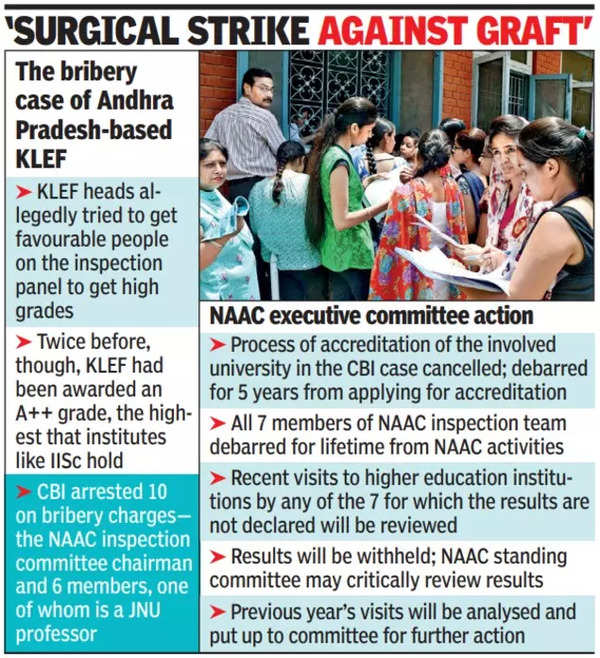MUMBAI: In a decisive move to eliminate corruption and streamline the accreditation process, National Assessment and Accreditation Council (NAAC) has announced an immediate halt to physical inspections of colleges. Accreditation teams will now conduct evaluations entirely online, replacing on-campus visits with virtual assessments.
For universities, though, the transition will be hybrid – most inspections will take place remotely, but a select number of reviewers will still visit campuses to maintain some level of direct oversight.
Delhi Election Results 2025
The decision follows the recent Central Bureau of Investigation (CBI) arrests in the case involving Andhra Pradesh-based Koneru Lakshmaiah Education Foundation (KLEF), where members of the institution’s management allegedly bribed NAAC peer visit inspectors to secure favourable ratings.
“We decided to do all it takes to weed out elements of corruption. Cancelling physical visits will arrest the problem in a huge way,” said NAAC executive committee chairman Prof Anil Sahasrabudhe. “So many inspection visits take place every week, and it was very tough to monitor what transpired during these visits. Now, all this will be recorded.”

NAAC director Ganesan Kannabiran called the shift to online inspection a “surgical strike” against corruption. “NAAC’s peer review system faced a challenging situation due to the recent CBI case. These are undesirable to the higher education system, and NAAC, being a quality assurance agency, is determined to eliminate such practices through definitive actions,” he said.
The long-anticipated basic (binary) accreditation model, recommended by the K Radhakrishnan Committee, was set for launch in July 2024 but did not take off. It has now been pushed to April-May 2025. The new timeline will also see the introduction of maturity-based graded levels (MBGL), a system designed to encourage institutions to enhance their academic and research capabilities. Special committees are finalising its framework.
Around 650 institutions are in queue under the old grading system. Of these, nearly 50% are undergoing their second accreditation cycle and have been given the option to retain their current grade until the new system is in place. First-time applicants will have the choice to opt for the new basic accreditation model. “Implementing these new frameworks – basic accreditation and MBGL – along with advanced IT-based assessment features will not only enhance objectivity but eliminate unfair practices too,” said Sahasrabudhe.
